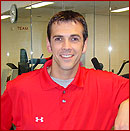Movement, not muscles
Sargent College camps train athletes for better play

Late in August, as summer-term classes end and the dorms empty, grunts and groans continue to echo throughout the Track and Tennis Center.
Four times a week, for 90 minutes each session, athletes run up and down the stadium stairs, practice Olympic-style weight lifting, and work on agility exercises as part of Sargent College’s strength and conditioning camps at the BU Athletic Enhancement Center. Athletes of all ages and at all competition levels attend the camps, which continue through September 3.
“It’s a program designed to help improve performance and prevent injury,” says Noel Vigue, the head strength and conditioning coach and the program’s director. “Here we train movement, not muscles.”
The purpose, he explains, is to help athletes build the skills, such as agility and balance, that they need in competition — not simply to gain strength and endurance. Swimmers, for example, work on building flexibility to prevent shoulder injuries, while rowers do exercises to boost their leg power. Soccer, lacrosse, and field hockey players work on speed and lateral movement. “They train as they would play,” Vigue says. “We’re getting away from a lot of the seated work where you isolate muscles.”
The three-year-old program has 80 athletes this summer — up from 50 last year and 30 in 2004 — and the group includes college athletes at home for the summer, amateur adults training for marathons or triathlons, and high school students. In the past, Vigue says, the program has drawn professional soccer referees, athletes from BU’s club teams, and students in the military ROTC programs.
When the summer sessions end, the Athletic Enhancement Center continues to serve as a community resource for local athletes, providing personal training sessions as well as clinics for high school athletes and adult fitness programs. (BU faculty and staff receive a 10 percent discount on services.) This fall, the center will offer workshops for runners and golfers and continue its ongoing seminar for parents and coaches, Raising the Student-Athlete.
“We’re looking beyond the fitness aspect, to take it a step further,” Vigue says. “I feel really good about what we’ve designed and how parents, coaches, and athletes respond.”